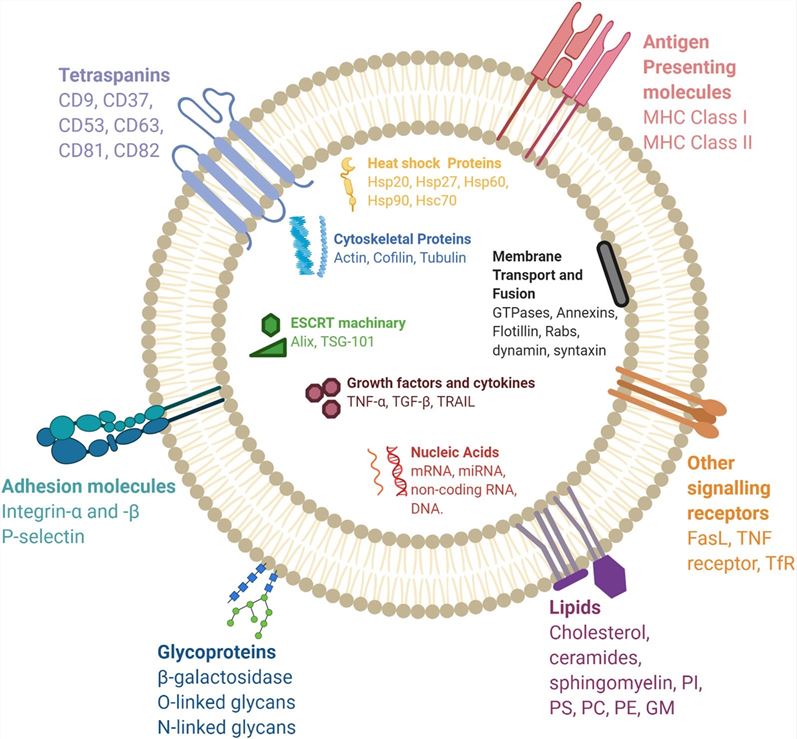Specificity Evaluation Service for Exosome Product
Overview Services Features FAQs
Overview
Three Types of Exosome (Exo)-specific Markers
Specific markers for Exo themselves
The distinctive identifiers of Exos pertain to proteins that exhibit significant enrichment both on the surface and within the confines of Exos. Examples of these markers include CD9, CD81, and TSG101, which are utilized widely for the purpose of Exo identification. This is primarily due to their profound involvement in the process of Exo formation and release, and their marked concentration within the Exo.
Inherited specific markers in Exo
Exos are formed through the endoplasmic reticulum and multivesicular systems within cells, and these intracellular structures fuse with the Exo membrane during Exo formation, resulting in the enrichment of some donor cell-specific proteins on the Exos. For example, the specificity of Exos secreted by neuronal cells mainly lies in containing L1 cell adhesion molecular. In addition, since Exos are the carrier of material exchange between cells, donor cells will release Exos containing specific regulatory molecules or ligands, allowing Exos to regulate other recipient cells on their own behalf. For example, Exos derived from dendritic cells have CD40 ligand on their surface, which can bind to CD40 receptors on the surface of target cells.
Loaded specific markers in Exo
Since Exos can be engineered before being secreted and after being secreted, engineered Exos are endowed with various specific targeting functions, including modified molecules targeting specific tissues or cells and targeting and therapeutic molecules targeting specific genes or pathways within recipient cells. For example, Brain-targeting peptide rabies virus glycoprotein is loaded onto Exos by endogenous modification as usual.
 Fig.1 Composition of exosomes.1,2
Fig.1 Composition of exosomes.1,2
In the qualification process of Exo products, the specificity evaluation of Exo products is a very important link. In order to ensure the functional specificity of Exo products and meet customer needs, Creative Biolabs provides high-quality specificity evaluation service for Exo products by ensuring the correctness and effectiveness of the above three types of specific markers.
Services
Comprehensive Exosome Specificity Evaluation Service at Creative Biolabs
Creative Biolabs has the ability to provide the most comprehensive Exo specificity evaluation service, specifically covering the following technical services.
|
TECHNICAL SERVICE
|
EVALUATION ADVANTAGE
|
|
Nano flow cytometry
|
Rapid detection of specific markers on the surface of Exos based on a small sample volume. This method has high sensitivity and can simultaneously detect multiple molecules on the surface of Exos.
|
|
Western blot
|
By being recognized and bound by specific antibodies, the amount of target Exo-specific marker protein is presented as band intensity. The relative content of the protein can be estimated by equal total protein loading and band grayscale analysis.
|
|
Enzyme-linked immunosorbent assay
|
Based on the recognition and binding of antibodies or antigens, the amount of target Exo-specific marker protein is presented in color intensity. This method has the advantage of high-throughput detection and is suitable for large-scale samples.
|
|
Mass spectrometry
|
All the molecules contained in Exos serve as fingerprints of Exos, which can be analyzed by mass spectrometry and presented as molecular profile. You can also evaluate the content of interested molecules in Exos through targeted omics analysis.
|
|
RNA analysis
|
The target RNA can be quantitatively analyzed by gene amplification.
|
|
Efficacy verification
|
Whether the specific markers in Exos can exert function can be evaluated by conducting in vivo and in vitro functional experiments of Exo products.
|
Features
-
Comprehensive exosome marker protein analysis
-
High-precision, high-sensitivity detection technology
-
Professional technical team
-
Innovative perspectives on exosome specific evaluation
If you plan or are in the process of large-scale production of Exos and need to evaluate the specificity of the expected or obtained Exo products, please contact us.
FAQs
Q: How do you detect inherited specific markers in Exo?
A: For inherited specific markers in Exo, we use advanced techniques such as Nano flow cytometry, Western blot, and efficacy verification to ensure high accuracy and sensitivity.
Q: How does your company verify engineered exosomes carrying marker molecules?
A: We verify whether engineered exosomes successfully carry target proteins or RNAs through multiple techniques. These include, but are not limited to, Western blot, enzyme-linked immunosorbent assay (ELISA), mass spectrometry, and PCR. Our detection protocols can precisely confirm the specific presence of target molecules.
Q: How do I choose the right exosome-specific evaluation service for my research project?
A: Our professional team will help you design the optimal experimental plan based on your specific needs. We will thoroughly understand your research goals and requirements, then recommend the most suitable detection schemes and technologies to ensure the most valuable data is obtained.
References
-
Gurung, S.; et al. The exosome journey: from biogenesis to uptake and intracellular signalling. Cell Communication and Signaling. 2021, 19(1):47.
-
Distributed under Open Access license CC BY 4.0, without modification.
For Research Use Only. Cannot be used by patients.
Related Services:

 Fig.1 Composition of exosomes.1,2
Fig.1 Composition of exosomes.1,2









